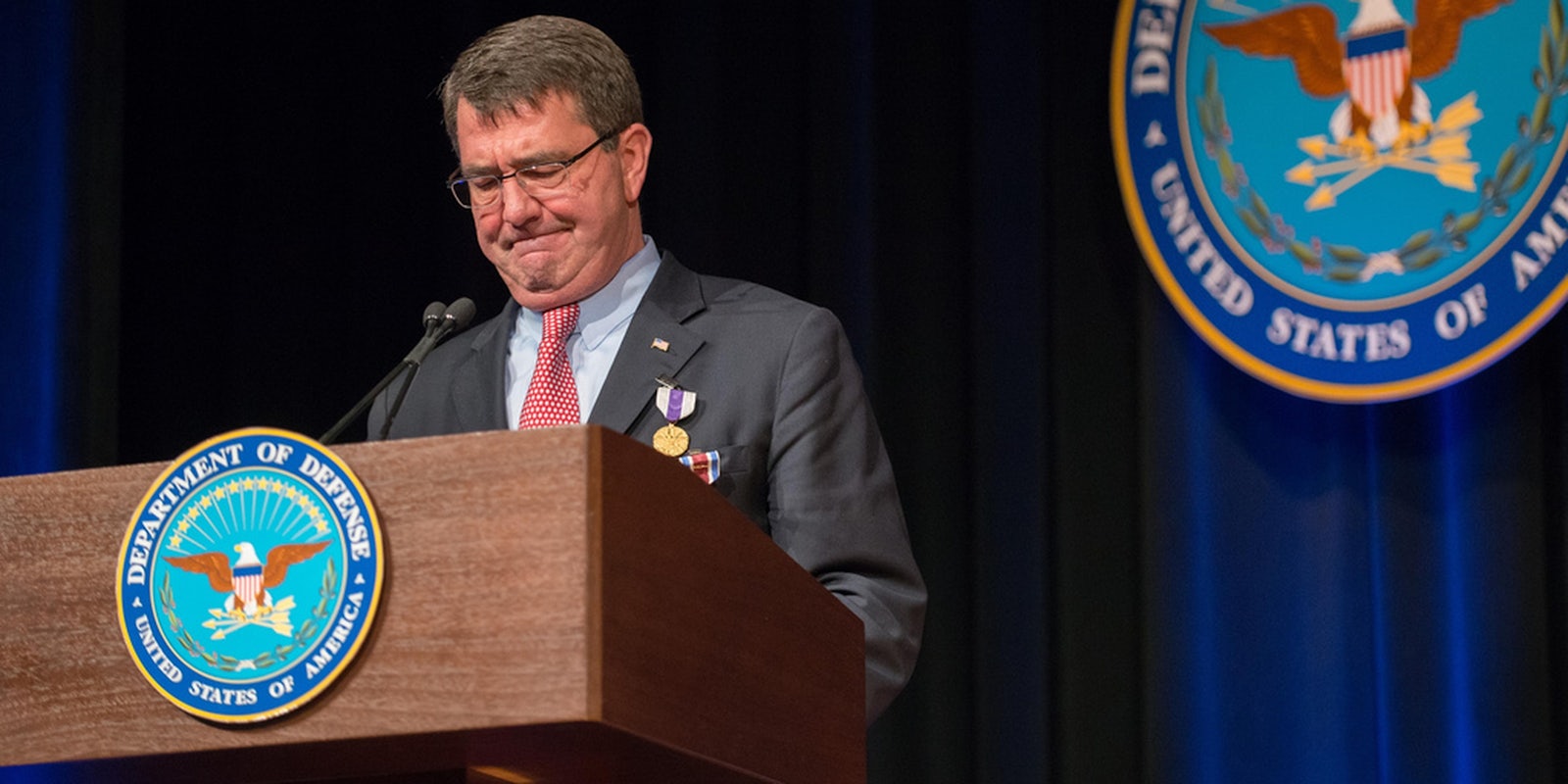Three years before 9/11, Ash Carter was already talking catastrophe.
Carter, confirmed Thursday as Obama’s new Secretary of Defense, vividly predicted in 1998 a near-future terrorist attack that would have long-lasting consequences beyond the immediate loss of thousands of lives.
“Constitutional liberties would be challenged as the United States sought to protect itself from further attacks.”
Carter’s new command post at the Pentagon includes the National Security Agency and various other American intelligence outfits, the agencies whose massive surveillance operations were exposed by Edward Snowden in 2013.
In the 1990s, while he was in academia, Carter wrote a farsighted report about an imminent and profound challenge to American civil liberties in the wake of the attack he predicted.
“An act of catastrophic terrorism that killed thousands or tens of thousands of people and/or disrupted the necessities of life for hundreds of thousands, or even millions, would be a watershed event in America’s history,” Carter wrote in 1998 while he was a Professor of Science and International Affairs at Harvard University’s John F. Kennedy School of Government.
The American government’s lack of foresight and preparedness has been criticized for over a decade when it comes to the 9/11 attacks, a fact that makes Carter’s prescient paper so striking. Further, the paper, titled Catastrophic Terrorism: Elements of a National Policy, has proven utterly prophetic in describing an extended War on Terror and its effects on the constitutional rights of Americans.
“It could involve loss of life and property unprecedented for peacetime and undermine Americans’ fundamental sense of security within their own borders in a manner akin to the 1949 Soviet atomic bomb test, or perhaps even worse.
Constitutional liberties would be challenged as the United States sought to protect itself from further attacks by pressing against allowable limits in surveillance of citizens, detention of suspects, and the use of deadly force.
More violence would follow, either as other terrorists seek to imitate this great ‘success’ or as the United States strikes out at those considered responsible. Like Pearl Harbor, such an event would divide our past and future into a ‘before’ and ‘after.’ The effort and resources we devote to averting or containing this threat now, in the ‘before’ period, will seem woeful, even pathetic, when compared to what will happen ‘after.’
Our leaders will be judged negligent for not addressing catastrophic terrorism more urgently.”
What does it mean that the man who now controls much of America’s vast surveillance apparatus knew in the 1990s that it could soon press “against allowable limits?”
Carter is undeniably smart by all accounts but, to activists hoping for reform, the new Secretary is a wonky insider who called Snowden’s 2013 leaks “a cyber Pearl Harbor”—not the reaction you’re hoping for if you want big changes to mass surveillance.
Carter most recently served as the Pentagon’s second in command in 2011 to 2013, leaving just months after Snowden’s revelations first hit. Before that, he was in charge of the Pentagon’s tech and weapons buying earlier in Obama’s presidency. His Pentagon career began even earlier when he served under Bill Clinton working on international security policy.
Once 9/11 actually happened, Carter criticized the West for its failures to prevent exactly the kind of “A-list” attack he predicted.
“The United States needs better capabilities for detection of catastrophic terrorism,” Carter wrote in the winter of 2001. “This involves surveillance of persons and motives—a delicate matter—but also surveillance of potential means of destruction, such as crop dusters, germ cultures, and pilot instruction. Surveillance of means raises far fewer civil liberties issues than does surveillance of persons, and it might be much more effective.”
Carter’s post-9/11 report reveals key details about how he thinks of mass surveillance and the dangers it poses to civil liberties. But beneath the surface, it also raises a few important questions.
“Placing all Middle Eastern male noncitizens resident in the United States under surveillance, for example, is both objectionable and impractical,” he wrote. “But inquiring after all those persons, of whatever nationality, who take flying lessons but are not interested in learning to take off or land, who rent crop dusters, or who seek information on the antibiotic resistance of anthrax strains or the layout of a nuclear power plant is feasible and might be extremely useful.”
How exactly does one actively monitor and “inquire after” the information that is sought by individuals? Carter had been shaping Internet policy for years at this point—in another act of vision, he warned of the threat of cyber-terrorism in the ‘90s—so is he talking about mass Internet surveillance here?
Carter’s public reaction to Snowden’s revealing mass spying wasn’t any kind of substantive reflection on policy. Instead, he just seemed a bit perturbed—he called Snowden a “knucklehead”—that one person could have so much power against vast national security networks.
While he clearly and plainly foresaw profound challenges to constitutional liberties, Carter has repeatedly been in top Pentagon positions while the Department of Defense engaged in exactly the sort of “pressing against”—critics would say strolling right past—”allowable limits in surveillance of citizens” that he explicitly warned against.
Photo via Chairman of the Joint Chiefs of Staff/Flickr (CC BY 2.0)


